By
Team DIGO | 09/06/2013 | in
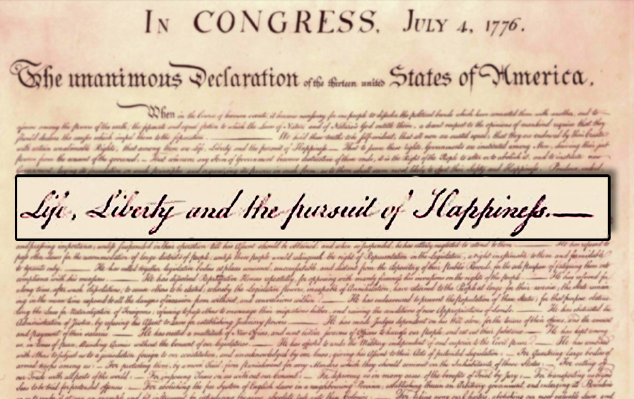
MediaPost News, By Amy Corr
Pinnacle Entertainment has selected DiMassimo Goldstein as AOR for its L’Auberge branded casinos in Lake Charles and Baton Rouge, LA. The agency is charged with developing and implementing an overarching brand strategy and bringing a new campaign to market including advertising, direct, digital, social, design and media planning and buying.
To see the original post, click here.
By
Team DIGO | 07/23/2013 | in
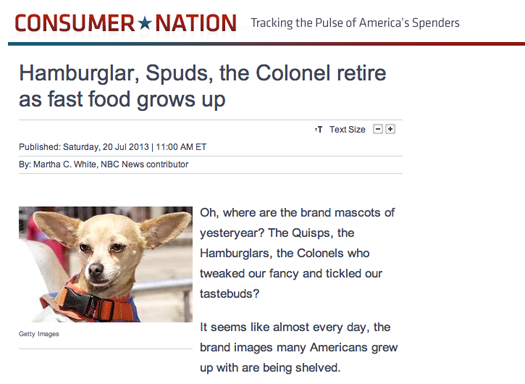
Martha White, CNBC.com
Oh, where are the brand mascots of yesteryear? The Quisps, the Hamburglars, the Colonels who tweaked our fancy and tickled our tastebuds?
It seems like almost every day, the brand images many Americans grew up with are being shelved.
The latest victim could be the string-tie wearing symbol of KFC, Colonel Sanders. Although he got a face-lift back in 2006, the Colonel Sanders logo edged closer to retirement this week as the KFC brand rolled out a new restaurant concept, KFC eleven, without the Colonel’s goateed visage accompanying it.
Read the full article here.
By
Team DIGO | 07/01/2013 | in
I was starting to feel I was un-shockable. Working in advertising with lots of young-creative-wired people, I see just about everything, or at least I thought I did.
And then today I discovered Ana. Also known as the Pro Ana movement. Or Proana.
Ana is a global community committed to supporting and encouraging anorexics in their achievement of ever more harrowing weight loss goals.
I’m shocked. And I’m shocked that I’m shocked.
What’s next, Pro-Dep, for people who want to be more depressed? Is there a Pro-OCD community? If so, I don’t want to read the comments!
How about a Pro-IBS community? Could I troll the message boards to figure out what I’d have to eat to shit pure liquid 100% of the time?
OK, I’ve tried humor as a coping mechanism, but the shock hasn’t worn off.
People die of anorexia nervosa and other eating disorders. These are compulsive behaviors that girls and young women , mostly but not exclusively, use to remain unconscious of what would be rather harrowing emotions if they felt them. It’s a viciously circular death spiral if ever there was one. I have known young, promising woman who have died of this. I knew one woman whose heart was so badly damaged that a half a beer would throw her into unwakeable state. Anorexia is serious, insidious and intractable. I have worked – as a humble intern – along side doctors, nurses and social workers who were fighting valiantly against this killer. I have seen how hard won is the little bit of progress they sometimes achieve. And I have seen the slips and the losses too.
So, to find that in addition to all the internal hardness of anorexia is now added a ready social support system, in short to find that the murderer has committed, connected allies all over the world… well, I am just shocked!
I, who have been saying that it’s a social world for nearly a decade. I ,who write here and elsewhere regularly about how the social web changes everything. I have finally been caught off guard. And I’m disgusted. And, admittedly, intrigued.
The personal is now social.
We need to meet the enemy on the field of battle, which is now the social web. If the disease has a social support system, then the cure must have an even more powerful social support network.
The battle lines are drawn.
Let’s fight, socially.
By
Team DIGO | 07/01/2013 | in
Growth Key: We can own substance in a world of flash, but in the end, the proof is in the platform.
The category of online trading has no shortage of flash and swagger. Everyone is making similar claims, causing noise and clutter. Our competitors were outspending us 10 – 1. We needed to change the game and the way we use TV by getting people to take our tour and see the TradeStation difference for themselves.
Our multimedia campaign won Consumer Retail Best in Show at the 2013 Annual Financial Communications Society Portfolio Awards.
The 19th annual Financial Communications Society Portfolio Awards recognized last year’s most creative and innovative financial PR, advertising, collateral, and digital media efforts. More than 450 guests attended the event last Thursday at Terminal 5 in Manhattan.
Five “Best in Show” award winners featured a mobile technology solution, app, or multimedia campaign that incorporated social media and the web into more traditional communications efforts.
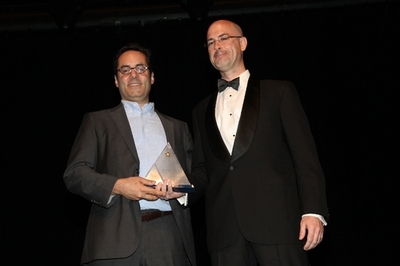
Pictured: Mark DiMassimo, CEO of DiMassimo Goldstein, and Erik Jepson, CMO at TradeStation, who won Consumer Retail Best In Show for TradeStation’s multimedia campaign “The Proof is in the Platform” created by DiMassimo Goldstein
By
Team DIGO | 06/26/2013 | in
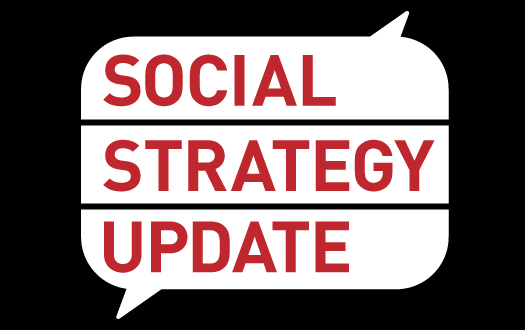
Here is the Social Media Update for the week.
1. Instagram Video Don’t Make Me Love You
Instagram has launched a new video option similar to Vines. This will create competition for Twitter’s Vine app. Instagram is ahead of the game, they smartly avoided many of Vine’s initial missteps like leaving out hashtag and front-facing camera support. They also included filters for the videos and longer video durations.
2. Report: Facebook Working on a Flipboard-Like News Reader
3. Branch Launches Potluck, a Stress-Free Social Network
4. Snapchat Introduced SnapKidz for Users Under 13
5. Instagram Gets Video and Other Top Comments
6. Jim Beam Thinks Twitter’s ‘Amplify TV’ Will Better Ad Copy
7. Twitter’s Future: Commerce, Diner Reservations and More TV Tie-Ins
8.Viral Content
Nik Wallenda Survives Insane Grand Canyon Tightrope Crossing
A Chance to See Saturn, For the First Time in 7 Years
Obama Singing Get Lucky By Daft Punk
By
Team DIGO | 06/12/2013 | in
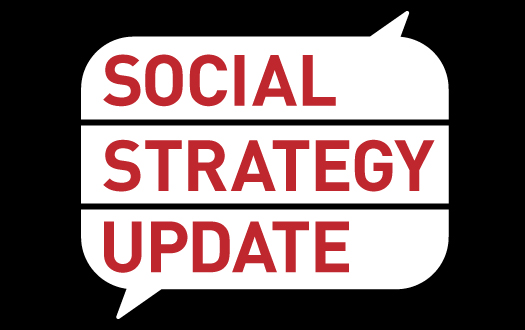
Here is the social media update for the week!
1. Why Google Wanted Waze
2. Turtle Wax’s 7% Twitter Engagement Rate Highlights Social Strategy
3. How Does Superman Shave? Gillette Asks Some Supergeeks Who Might Know
4. Electric Car, Powered By Social Media, Rolls Across the USA
5. Apple Announces This Year’s Design Awards Winners
6. The Marketer’s Guide to Reaching Millennials
7. Hashtags in Bathrooms? CMT Displays #CMTawards Above Toilets
8. Viral Content:
28 Animals Who Have Made A Huge Mistakes
By
Team DIGO | 05/31/2013 | in
The 19th annual Financial Communications Society Portfolio Awards recognized last year’s most creative and innovative financial PR, advertising, collateral, and digital media efforts. More than 450 guests attended the event last Thursday at Terminal 5 in Manhattan.
Five “Best in Show” award winners featured a mobile technology solution, app, or multimedia campaign that incorporated social media and the web into more traditional communications efforts.

Pictured: Mark DiMassimo, CEO of DiMassimo Goldstein, and Erik Jepson, CMO at TradeStation, who won Consumer Retail Best In Show for TradeStation’s multimedia campaign “The Proof is in the Platform” created by DiMassimo Goldstein
By
Team DIGO | 05/29/2013 | in
An agency is a machine that a client uses to get a result.
Maybe someone at Google, or down on Wall Street, thinks Google is a humungous corporation with many business interests.
Ridiculous!
Google is a wonderful little machine that you use to produce results. Search results, to be precise. If Google wasn’t that first, it would never have become any of those other things.
A McDonald’s is a sweet little machine that gives a franchisee a predictably great business. Walmart is a machine that brings people, originally in rural areas, all the stuff they could need and want at ridiculously affordable prices. Facebook comes down to the page, a sweet little machine that connects people to their friends and acquaintances. Twitter is the irresistible little gizmo that people use to share and follow.
Amazon is a machine you use to get things from the Internet to your door.
When your sweet little machine reaches a certain level of excellence, of course it starts to sell like hotcakes. When it produces it’s result predictably, economically and pleasingly, it multiplies and replicates through geometric progressions of growth.
An agency is a machine that a client uses to get a result. A communications result. A marketing result. A business result.
That’s what we’re here for. That’s the sweet little gizmo that makes all the difference.
So, if we’re focused on fundamentals, then we’re focused on how well that machine is working for our clients. We’re working every day to make that machine better and better. We’re reporting every week. We’re fine-tuning the measurement. We’re exquisitely open to feedback about those results and the experience of using the machine.
What marketer doesn’t want an excellent results machine?







